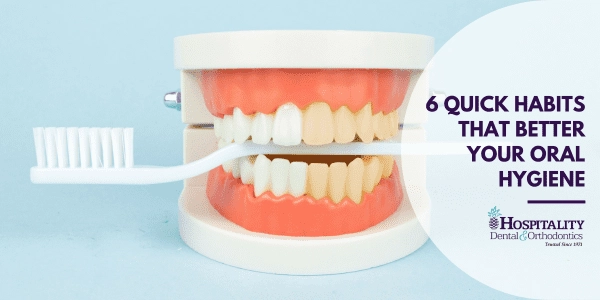
Maintaining good oral health habits is about so much more than vanity – though having a smile that sparkles certainly feels good. The truth is, good oral health is a key component to overall health.
Great news: your oral health can improve faster than you can get six-pack abs. No gym memberships required with these six quick oral health habits that will give you big-time results without requiring a big-time investment.
1) Incorporate Fluoride
According to the Cleveland Clinic, fluoride reduces the risk of cavities by a whopping 25%, while also actively strengthening teeth. It achieves this in four ways, by re-mineralizing tooth enamel, reversing tooth decay, slowing down demineralization of the tooth enamel, and preventing bacteria growth.
This super mineral can be toxic in large amounts, but it’s not easy to reach that level with an over-the-counter toothpaste. And that’s the best part – all you have to do to get a benefit is switch to a fluoride toothpaste. You’re already buying toothpaste, right?
2) Wait to Brush
A classic piece of advice is to brush after every meal and we applaud anyone who is diligent about their brushing routine. But if you’re consuming highly acidic food and drinks (like a morning glass of orange juice), you could do damage by brushing as soon as you finish the last sip.
Juices, wine, sodas, and tomatoes are just a few of the foods that temporarily soften your tooth enamel. Even though your intent is good, a vigorous brushing when the enamel is in a temporarily weakened state can lead to long-term wear. Instead, wait 30 to 60 minutes to brush after an acidic meal.
3) Add Water Breaks
Directly after a meal, try to drink water and give your mouth a good rinsing swish, loosening invisible bits of food (and that piece of spinach your friends didn’t mention).
Drinking more water generally promotes good oral health, as dehydration makes it easier for bacteria to grow, reduces the flow of protective saliva, and can lead to bad breath. Water is incredibly useful for all these reasons, and it cleans without being abrasive.
4) Take It Easy
Speaking of being abrasive, the most enthusiastic brushing routines can sometimes cause wear. Most people can achieve optimal oral health by applying gentle pressure as they brush with soft bristles.
More important than brushing hard is brushing thoroughly, catching every tooth, and keeping the brush tilted at a 45-degree angle to the gumline. Adjusting the bristle-style and brushing pressure is another great way to level-up your brushing habits without adding any time to your brushing routine.
5) The Tip of the Tongue
As you look at changing bristle styles, consider buying a toothbrush with a tongue scraper on the back. Tongue scrapers can eliminate bacteria, remove debris and dead cells, improve the appearance of your tongue and help fight bad breath.
Incorporating a light scraping over the entire surface of your tongue (always back to front) every time you brush might take an additional 3-5 minutes daily, but there’s one more benefit that makes it all worthwhile – it could improve your sense of taste.
6) Eat Your Vegetables
Getting the right amount of fibrous vegetables in your diet has a whole range of benefits. But did you know that some crunchy vegetables can actually help whiten your teeth?
Try replacing that afternoon pack of potato chips with cauliflower, broccoli, or celery. The raw vegetable bits scrape plaque off your teeth, and the longer you have to crunch, the more enamel-saving saliva you produce.
Nothing can replace taking the time to regularly see a dentist, but with these six quick tips for improving oral health, there’s plenty you can do on your own between regular visits to the dentist.
